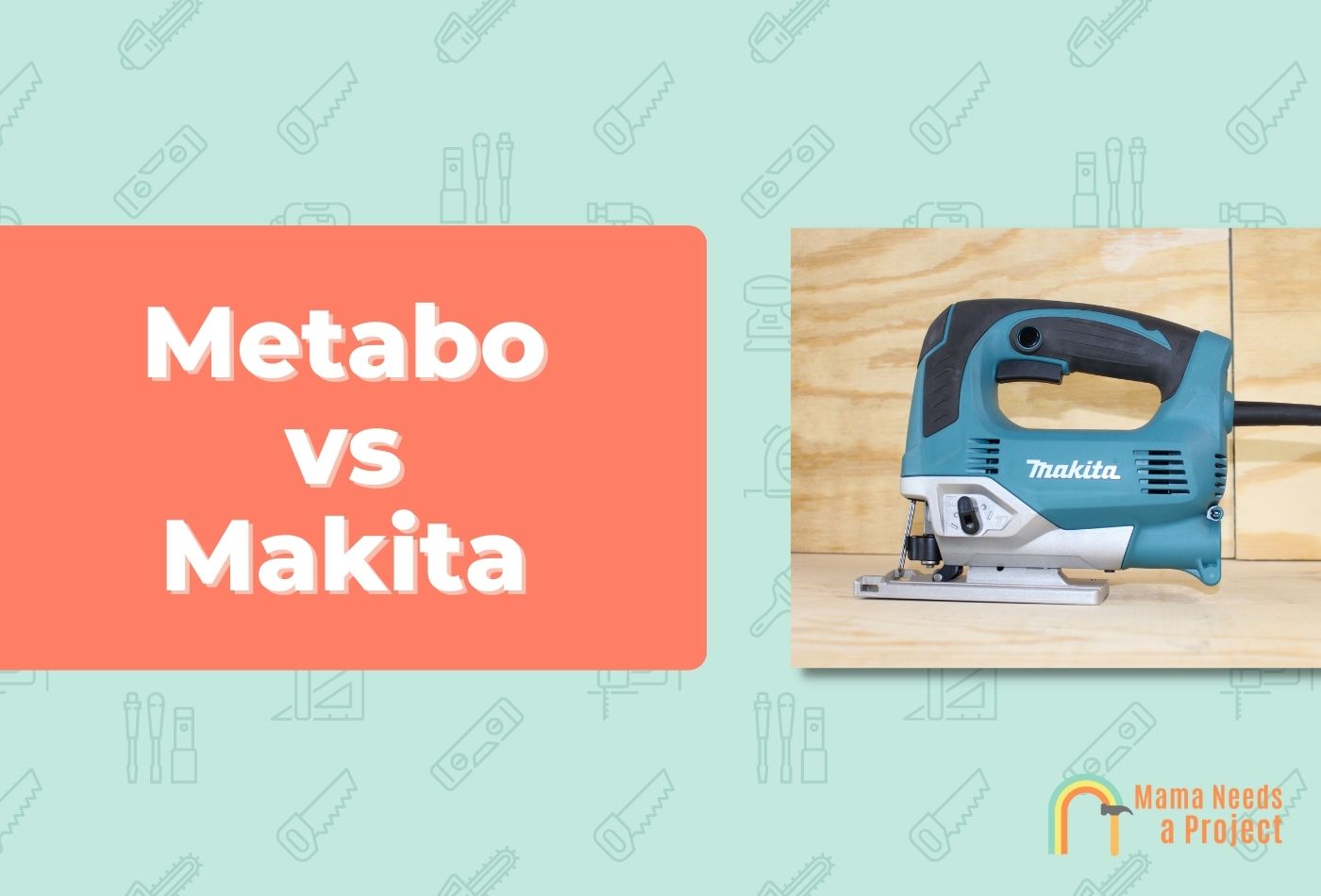Metabo vs Makita: Which Tools Are Better? (2024 Guide)
Makita is one of the most well-respected names in the power tool manufacturing space, and their products are known for being on par with those made by DeWalt, Hitachi, and Craftsman.
Then there’s Metabo, a lesser-known German tool manufacturer, but nonetheless one with a hundred-year-old reputation for manufacturing top-quality hand and power tools.
I’ve used both of these tool brands for years and have some strong thoughts.
So measured against one another, which brand is superior: Metabo or Makita?
In this article, I’ll compare Metabo HPT tools vs Makita tools to find out which tool brand is best. Let’s dig in!
- Metabo HPT tools are superior to Makita tools, mainly because Metabo tools employ better components and are designed to last long even if they perform heavy-duty tasks routinely.
- That said, Makita power tools are capable and reliable, and virtually everything in their much wider selection is more affordable than the comparable Metabo product.
Metabo vs Makita Power Tools
For the purposes of this article, I’ll compare Metabo HPT tools – which are different than traditional Metabo tools.
Quality & Reliability
When it comes to quality and reliability, both Metabo and Makita stand out as leading tool manufacturers.
Their products include numerous components that ensure efficient operation over the long term, and the durability of their products allows them to perform heavy-duty professional tasks with ease.
But the quality of Metabo tools, generally speaking, is slightly better than the overall quality of Makita’s tools, and that’s largely because Metabo tools utilize tougher and more-powerful components.
Product Lineup
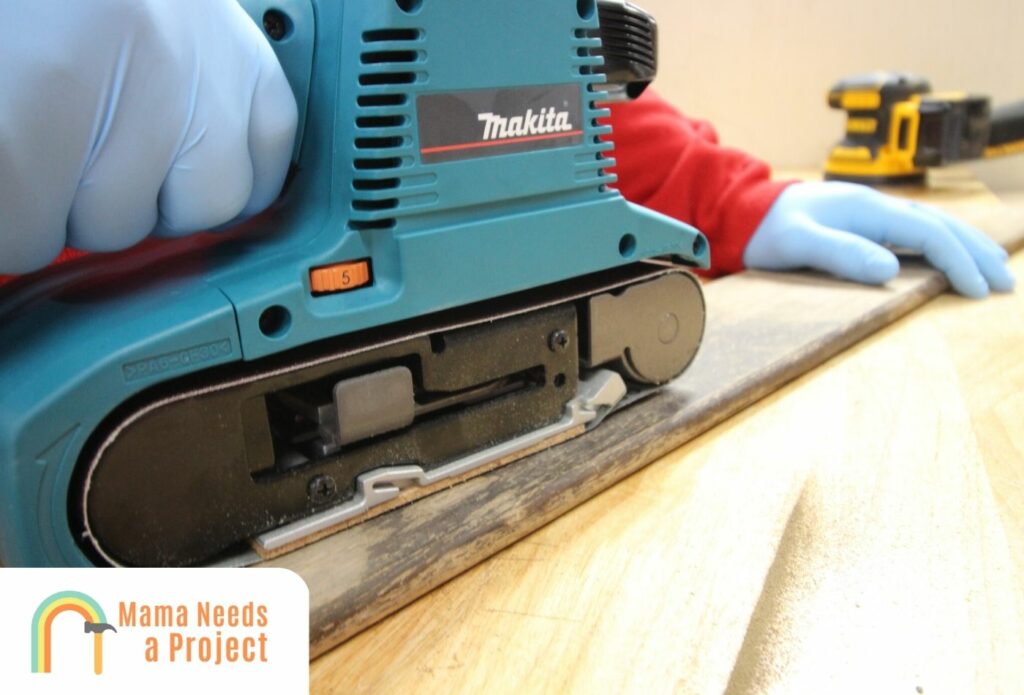
Makita has a wider selection of products, and at present it includes cordless and corded power tools, hand tools, outdoor equipment, automotive equipment, and other specialty tools.
Metabo’s selection is smaller by comparison, but they make virtually all the essential power tools and hand tools, along with some equipment that’s often utilized by a range of tradespeople.
Ease of Use
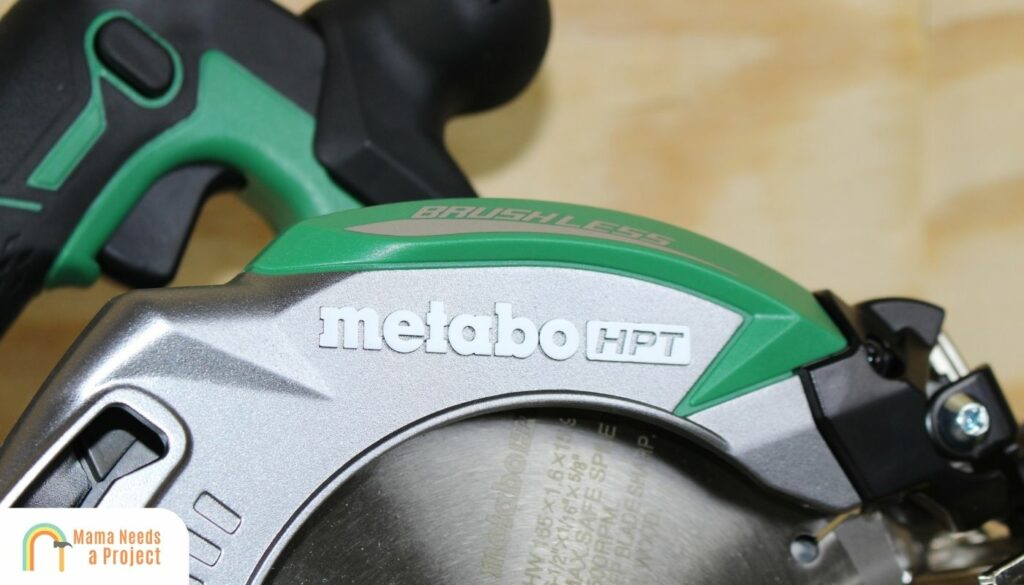
Both manufacturers put out tools that are accessible to professionals and hobbyists alike.
That said, if I had to pick one brand, I’d go with Makita, since their products have long been renowned for their simplicity and ergonomic designs.
Makita power tools may be simple, but they possess the capabilities necessary to carry out a range of tasks, and maintaining them is a breeze.
Plus, performing minor fixes on Makita power tools is easier. That said, if your Makita power tool is still under warranty, it’s best to have them handle the repair for free; the same goes for Metabo tools under warranty.
Features
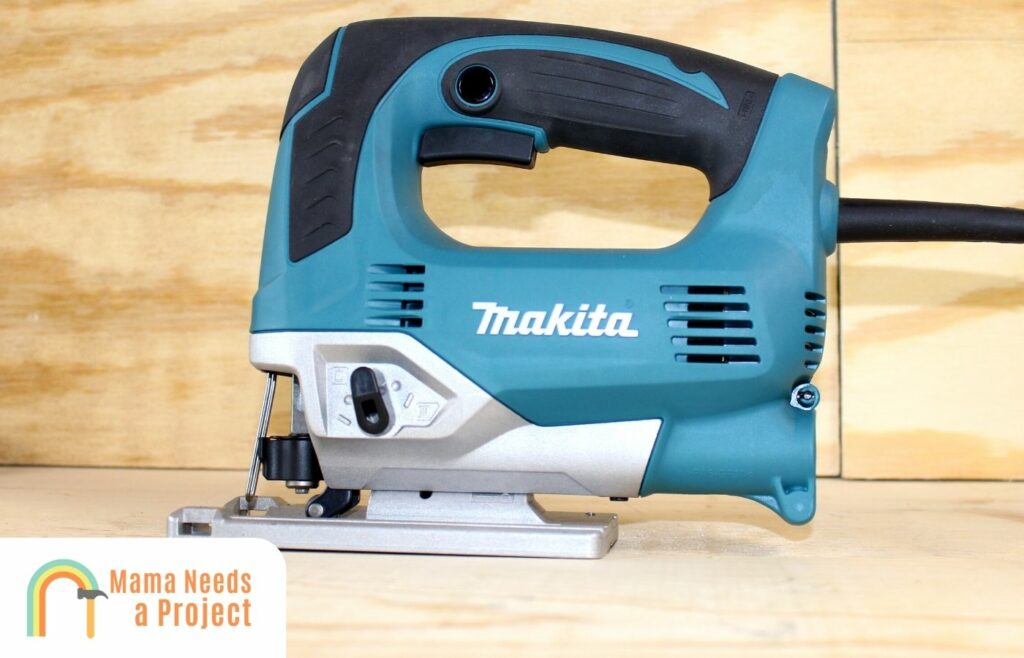
In terms of features available, Metabo tools and Makita tools are about even.
Both brands equip their cordless tools with features that ensure efficiency, durability, power, and safety.
The safety features are especially important, since they don’t just protect the user but also help to ensure the tool stays in working condition for longer.
Cordless Tools & Batteries
Metabo batteries may be more powerful than Makita batteries, but Makita batteries are known for being reliable, interchangeable, and safer.
Both brands use 18V batteries to power most of their power tools, and these batteries hold substantial charge up until a certain point.
Overall, you can count on the batteries both brands employ, so in this category it’s a draw.
Price
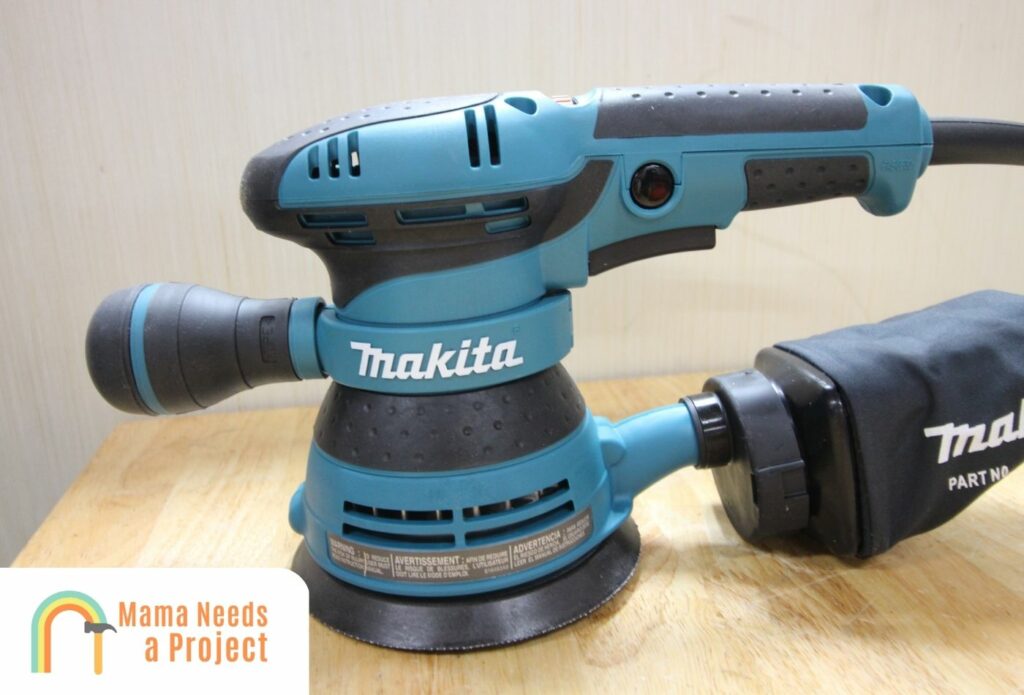
In most cases, Metabo HPT tools are more expensive than their Makita counterparts, and sometimes they’re twice as much or more. This is mainly because:
- Metabo HPT tools uses higher-quality components.
- A lot of the assembly is still done by hand.
- Their products are not as widely available as other power tools.
Warranty
There’s not much variation between Metabo and Makita warranties.
Most of their power tools come with a three-year limited warranty, while their hand tools come with a one-year limited warranty or a multi-day satisfaction guarantee.
Some of the larger, more expensive equipment will be under warranty after purchase for five years.
With both manufacturers, to exercise a warranty, simply reach out via phone or online. If the warranty is valid, they’ll tell you where to send the product; they’ll fix it or replace it free of charge.
Metabo vs Makita Drills
Metabo Drills
Metabo drill-drivers and hammer-drill drivers run on an 18V battery, and their maximum torque in soft materials is 575 ft.lbs., while their maximum torque in harder materials is 115q ft.lbs.
In steel, their max capacity is 1/2”, while in softwoods it’s 2.68”.
Powerful yet lightweight, Metabo drills employ brushless motors to ensure they can accomplish even heavy-duty drilling and fastening tasks.
They also have an “impulse feature” that’s great for removing damaged screws and spot-drilling smooth surfaces.
A range of safety components are employed—like electric brakes, overload protection, and anti-kickback tech—and these drills even have LED lights to ensure they can be used in dimly lit areas.
Additionally, every drill comes with a handy belt clip and bit holder, and since the drills are compact they’re easy to store.
Finally, if purchased directly from Metabo, their drills come with a three-year limited warranty and a 30-day money-back guarantee.
Makita Drills
Makita’s driver-drills and hammer driver-drills are cordless, lightweight, and built to last.
Thanks to a mechanical variable 2-speed transmission (0-500 & 0-1,700 RPM), these drills can accomplish a wide variety of drilling and fastening tasks, both quickly and easily.
They also come with an LED light to ensure they’re operable in dimly lit areas, and they have ergonomic handles to ensure they can be operated for an extended period without the user experiencing discomfort.
Their motors are auto-adjusting and can deliver up to 350 in.lbs. of torque. Plus, since they’re brushless, they run cooler and last longer.
The 1/2” keyless chucks they employ ensure bit change-outs are quick and simple, and a handful of safety components—like an electric brake and overload protection—ensure safer operation for the user and longevity for the tool.
And, of course, they only run on Makita batteries which require Makita chargers.
Finally, if purchased directly from Makita, their drills come with a three-year limited warranty.
Verdict
Metabo and Makita cordless drills are quite similar in terms of capabilities, performance, and components employed, but Metabow products are slightly more powerful and even more durable, which is why they’re preferred for professional, heavy-duty tasks.
But as superior cordless drills, they’re more expensive—in some cases $70 more than a comparable Makita drill.
Metabo vs Makita Impact Drivers
Metabo Impact Drivers
Metabo impact wrenches—otherwise known as impact drivers—also utilize brushless motors to ensure top-level efficiency no matter the task.
Powered by an 18V battery, these cordless power tools can deliver up to 295 ft.lb of torque, yet they’re designed to prevent kickback and overheating.
Thanks to 12 torque/speed settings, they can complete a variety of tasks quickly and easily, and they have LED lights built in to ensure efficient operation in areas with insufficient lighting.
They’re durable too, employing die cast aluminum gear housing.
Finally, they come with a three-year warranty if purchased directly from Metabo, and a 30-day money-back guarantee is also extended upon purchasing one of their impact wrenches.
Makita Impact Drivers
Makita impact drivers have four-pole, variable-speed motors (0-2,900 RPM & 0-3,500 IPM) that can deliver up to 1,460 in.lbs. of torque, making them great for a range of heavy-duty fastening tasks.
Lightweight and ergonomic, these impact drivers have a one-touch 1/4” hex chuck bit, and this ensures bit change-outs don’t take forever.
And like the Metabo impact wrenches, Makita’s tools have LED lights built in, and there are components and systems to prevent over-heating, over-discharging, and over-loading.
Makita’s impact drivers resist both moisture and sawdust well, and they’re made with high-quality steel to ensure durability.
Of course, they only run on Makita 18V batteries, and they come with a three-year limited warranty if purchased directly from the manufacturer.
Verdict
In this category too, the Metabo products are superior, but not by much.
Basically, any Metabo impact driver is a powerful tool that offers better control, more durability, and superior overall performance when compared to impact drivers made by other brands.
That said, Makita impact drivers are of highest quality, and therefore shouldn’t be automatically disregarded just because Metabo products are technically more powerful.
History of Metabo Tools
Metabo HPT, is a German power tool manufacturer with roots that go back 100 years.
The company was started in 1923, in NÜrtingen, Germany, by Albrecht Schnizler. However, it didn’t operate under the “Metabo” name until 1924.
In 1927, the company registered its trademark, and it’s been protected ever since.
Seven years later, they’d put out their first electric hand drill. Known as the Metabo 740, it was a 120-watt system with a 6.5mm (1/4”) capacity, and it could generate up to 1,200 rpm.
Throughout most of the War years, the company tread water, and its plants remained largely unscathed.
However, in the last year, 1945, it’d lose three-quarters of its plants, a loss that’d take three years to recover.
Nearly a decade later, they’d put out their first mass-produced hammer drill, the Metabo 76108/10.
And nine years after that, their first single-handle angle grinder hit the market, with its safety clutch that’d revolutionize the way manufacturers think about power tool safety.
Before the ‘60s were over, they’d put out their first impact drill, which featured one of the earliest electronic speed control systems.
In 1971, Metabo USA was founded in Long Island City, NY, and a decade later they’d release their first 1,000-watt impact drill.
Their first line of cordless power tools came out in 1983, and the Metabo Original Slicer came out in 1992.
Since then, they’ve put out dozens of innovative products, and today they have 25 subsidiaries worldwide, and they hold over 550 patents.
Their products are used across numerous industries, and they manufacture both corded and cordless power tools.
Metabo Pros
- Reputation: Metabo HPT tools have been around for a century, and very early on they were sought for their above-average quality.
- Power: Metabo HPT tools are not only built to last but powerful too, so they can handle every heavy-duty task with ease.
- Simplicity: Despite being capable power tools worthy of professional applications, Metabo products are simple and therefore easy to use.
Metabo Cons
- Price: Metabo spares no expense to manufacture its high-quality power tools, so they fetch a high price no matter where they’re sold.
History of Makita Tools
Makita was founded in 1915 by Mosaburo Makita, and its original name was Makita Electric Works.
For their first 30 years or so in business, the company specialized in manufacturing and repairing lighting and associated equipment, motors, and transformers.
Then, in the late 50s, they made a move that’d put them on the path to becoming the world-renowned power tool manufacturer they are today, when they put out their first portable electric planer.
About a decade later, 1969, they introduced the 6500D battery-powered drill, their first rechargeable tool.
Then in the late 70s, they put out the 6010D rechargeable drill, and this was their first tool powered by a nickel-cadmium battery system.
And right before the new millennium, in 1997, they debuted the 6213D rechargeable driver-drill at the Chicago Hardware Show, and this was their first tool powered by a nickel-hydride battery.
Their first lithium-ion battery system was the TD130D, and this came out in 2005.
Started in Nagoya, Japan, Makita now has manufacturing plants in Mexico, Brazil, China, Germany, Japan, Romania, the United Kingdom, the United Arab Emirates, Thailand, Canada, and the United States.
They did $6.5 million in sales in 2022, and at last count (2022) there were over 20,000 employees working for this company.
Makita Pros
- Efficient & Reliable Batteries: Most Makita tools run on their patented 18V battery, and this battery system is known for being efficient, reliable, long-lasting, and easy to charge.
- Extensive Collection: Makita makes a wide variety of power tools, and since most take the same lithium ion batteries, they can be classified as cost-effective, compatible tools.
Makita Cons
- Lifespan: Makita tools employ quality components, but the average Makita power tool lasts 5-7 years—or 10 years if it’s properly maintained over the years.
Makita vs Metabo: Overall Verdict
If you measure Metabo’s product line in its entirety against the full range of products Makita manufactures, what you’ll find is that Metabo products consistently outperform their Makita counterparts across pretty much all tool categories.
This is mainly because Metabo products are made with better materials that allow them to be more powerful and durable.
Makita does, however, have a wider selection, and their products are more affordable.
But if quality is what you’re after, and getting your hands on more niche tools isn’t an issue, then choose Metbo over Makita—no matter what the tool is.
Wondering how Makita compares to other brands? Check out my Makita vs DeWalt comparison for more info!
Final Thoughts
To recap, both Metabo and Makita manufacture capable, reliable power tools that can be used by professionals and hobbyists alike, but Metabo’s line of products is technically superior because they employ higher-quality materials and can achieve better results in a shorter period.
But both brands believe in equipping their tools with all the features needed to be successful, so regardless of whether you pick up a Metabo or Makita tool, chances are you’ll have something that can efficiently do what it was designed to do, and it shouldn’t give you any fuss.

